The news site OPB [Oregon Public Broadcasting] posted an article titled “Climate change increasingly taking a toll on Oregon farmers, ranchers,” which claims that climate change is having such a serious impact on Oregon agriculture that farmers need special climate grief counseling to cope. This is false. OPB claims that droughts, wildfires, and heat waves are all getting worse with climate change, however data show that this is not true for Oregon.
OPB claims that farmers and ranchers in the state are “increasingly dealing with severe droughts, wildfires, sweltering heat waves and pests that can all-together decimate entire fields.”
Later in the article OPB says “more precipitation is falling as rain rather than snow in many areas of the Pacific Northwest,” and “there’s less snow and it melts earlier, which means less water will last long enough through winter and spring to feed streams and reservoirs for agricultural irrigators.” It is also claimed that summers are trending hotter, and extreme heat waves are more frequent.
Beginning with drought, Oregon has not been suffering from more severe droughts over time. According to data from the U.S. Drought Monitor, there is no indication that droughts in Oregon are worse today than they were 100+ years of warming ago. (See Figure below)
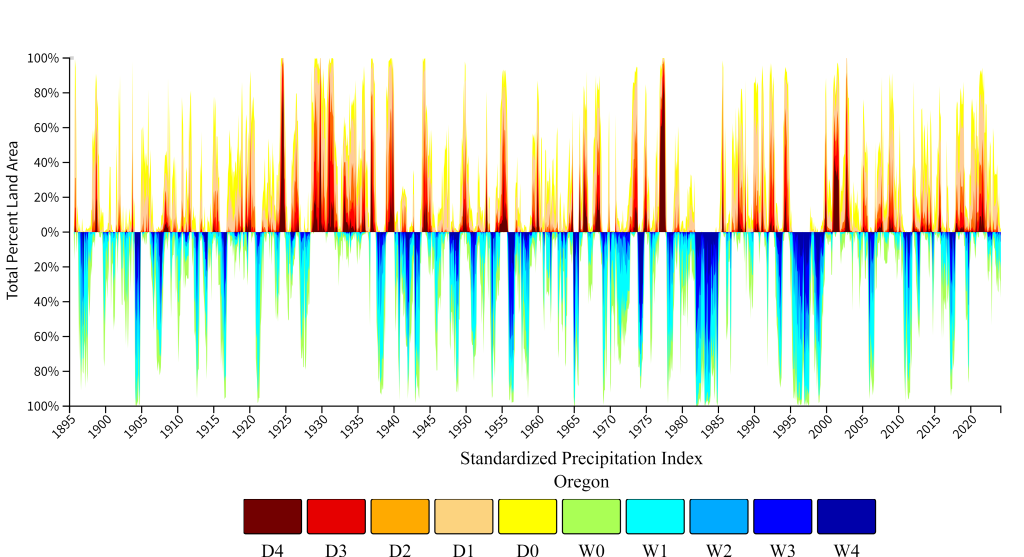
In fact, the worst droughts seem to have occurred in the 1970s and 1930s. D4 drought conditions – the most severe, are less frequent and widespread this decade than they were during those periods.
From the year 2000 to present, it’s even less alarming. Oregon only experienced severe drought for a few months in in three years out of the past 24, in 2004, and 2021-2022, but even then, the droughts covered less than a one-third of the state. Currently, 24 percent of the state is experiencing “moderate drought.”
This comports well with much of the data discussed for the United States in general in Climate at a Glance: Drought, which explains that the United States has actually seen fewer droughts over time as the climate modestly warms.
The reasoning for this is partially admitted by the article when OPB says that more precipitation is falling “as rain instead of snow.” This language is ripped directly from the NOAA National Centers for Environmental Information State Climate Summaries (NCEIS); however, the Oregon summary page merely says that more precipitation “is expected to fall as rain instead of snow,” not that it already is. No data indicates that snowfall has declined or is trending downward in recent years or decades, rather the NCEIS merely asserts that winter precipitation is expected to increase. Whether, in fact, precipitation will actually increase, and if it does, whether it will fall as snow or rain, is unknown and unknowable at the present.
National trends suggest that snowfall is decreasing slightly in late spring, but this doesn’t seem to be the case for Oregon as of yet, looking at data from the US Department of Agriculture National Water and Climate Center. (See figure below)
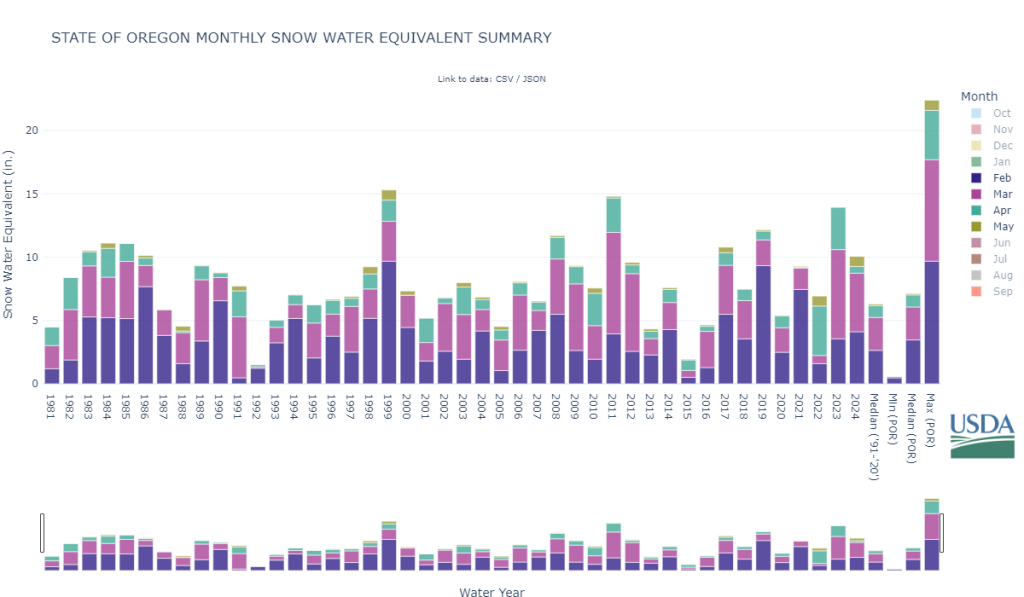
In fact, according to USDA data, which extends back to 1981, Oregon set its record for April snow-water equivalent in 2022, and second highest year was recorded in 2023.
Regarding wildfires, again, as Climate Realism has covered many times, U.S. wildfires are not getting worse, nor are they getting worse in Oregon.
According to the Oregon Department of Forestry data, except for two exceptional years in 2020 and 2021, when there was a drought, Oregon has not seen an increase in the acres burned in wildfires. (See figure below)

Heatwaves are likewise not getting worse in Oregon, at least not consistently. The NCEIS reports that, while the number of extremely hot (over 100°F) days in Oregon were above average since the late 1980s, reaching peaks in 2005-2009 and 2015-2020, “the number was well below average during the 2010–2014 period,” showing that there is a more complicated trend than a gradual march towards statewide eternal heat syncope. 2023 was likewise below average.
OPB claims that things are so bad for farmers that there is a need for “workshops and training to help food producers identify and define feelings like climate stress or grief and to find both emotional and agricultural ways to cope.” But neither the long-term weather nor crop production trends support the idea that climate change is killing agriculture in Oregon. As a result, there is seemingly little need to identify anxiety over seasonal crop failures as “climate grief.”
One of the examples of farm problems cited in OPB’s article was that of a hazelnut farmer losing his trees to frost. Yet, that one farmer’s experience is not representative of hazelnut production for Oregon as a whole. In fact, Oregon is the country’s top hazelnut producer. And, according to USDA data, hazelnut production in Oregon has exploded 149 percent since 1999. (See the Figure)
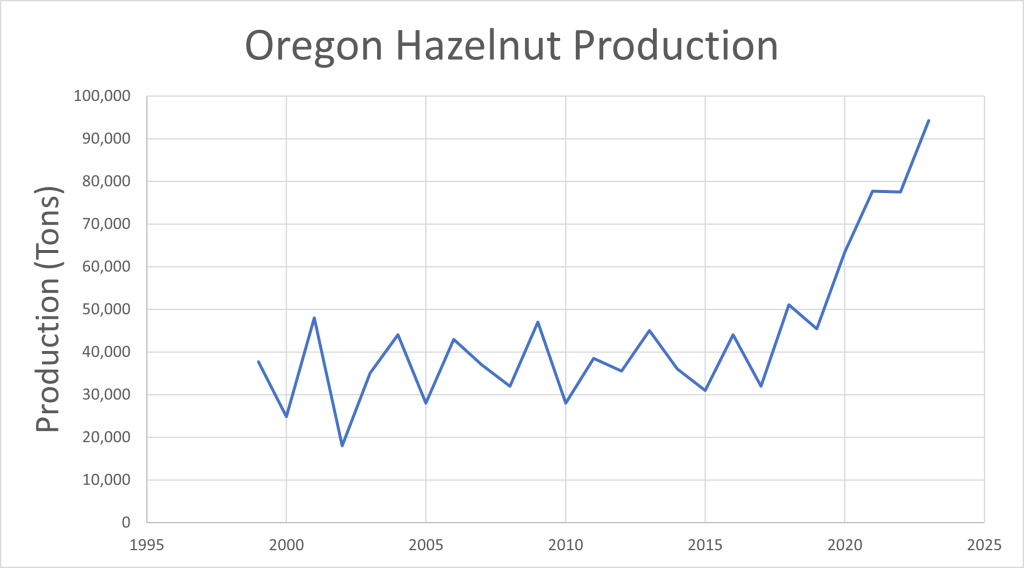
This example illustrates that anecdotal stories about the woes of a single or a few climate-concerned farmers is not a good metric for judging the state of agricultural production in the state.
OPB should stick to the facts instead of attempting to leverage the fears of farmers about crop losses into a climate story, and so should the organizers of so-called “Climate Stress and Grief” groups and seminars. Taking advantage of people whose livelihoods do depend on the weather by promoting unwarranted climate fears may make for good headlines and generate some income, but it is as wrong as efforts to ban the fossil fuel use, when fossil fuels make adaptation to, resilience in the face of, and recovery from extreme weather possible.




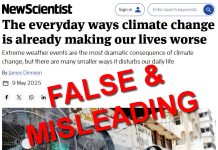
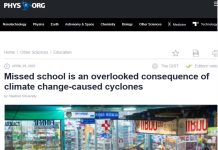









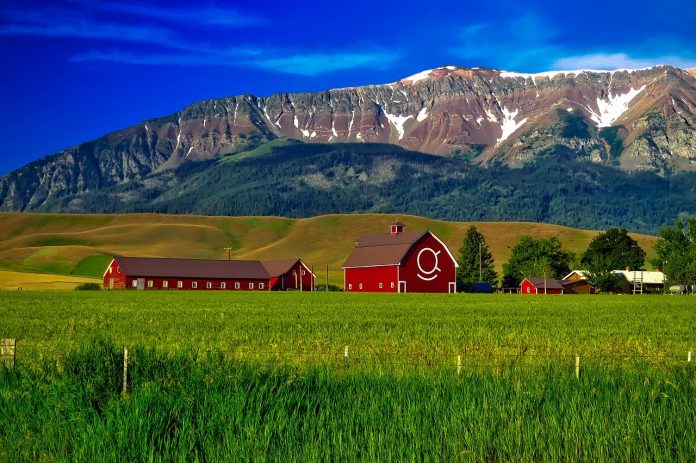




Another false flag story to exacerbate fears and concerns about perpetual doom when there is no such threat! This is like calling fire in crowded movie theatre! Fossils fuels
drive the farm equipment necessary to grow and harvest crops! We never get inputs from actual farmers on the affect of of extreme weather events on their crop yields or the ability to produce crops at all. I trust farmer reports and agricultural data output rather than some cherry picked climate extremism article misusing data for the sheer purpose of dramatizing crop projections into the future!